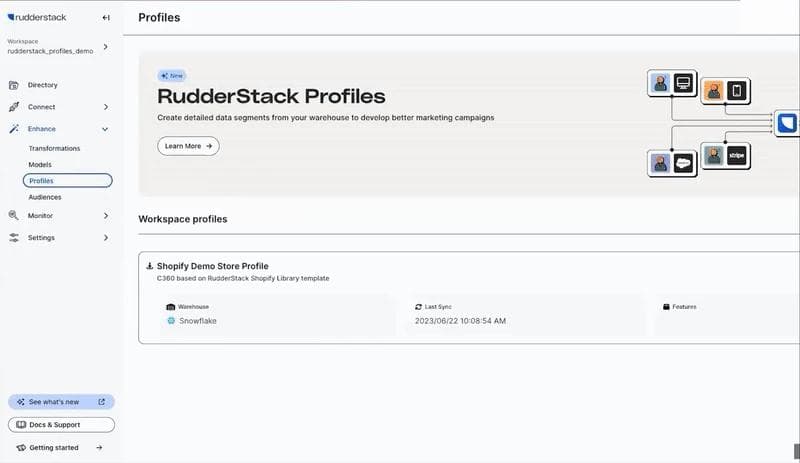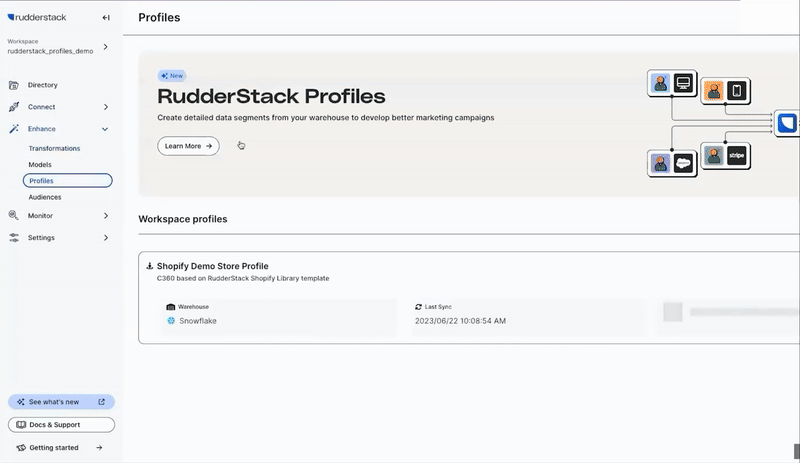Introducing RudderStack Profiles: Easily Build Complete Customer Profiles in Your Warehouse

If you’ve ever tried to build a 360 view of your customer, you know how time consuming and costly it can be. But the reward for getting it right is significant: a better customer experience, higher customer satisfaction, and ultimately increased revenue.
Today, in partnership with Snowflake, we’re introducing our customer 360 solution, RudderStack Profiles. With Profiles, data teams can easily build complete customer profiles in the warehouse without months of complex data wrangling or limited SaaS tools. Instead, they can quickly build a complete view of the customer, increase ROI of their data warehouse investments, and further position themselves as strategic partners to the rest of the business.
Using Profiles, our beta customers have seen a 5-10x gain in data engineering productivity, 2x lift in AI/ML model development speed, and have delivered 3x more ML-driven marketing campaigns.
What is RudderStack Profiles?
RudderStack Profiles is a data unification tool that makes it easy to build a customer 360 in your warehouse.
Instead of writing mountains of SQL or dealing with the limits and data silos of costly SaaS tools, Profiles allows your data team to specify important customer traits, then runs the joins and computations automatically, producing an identity graph, user features, and a full customer 360 table in your warehouse.
Profiles supports use cases for machine learning, marketing, customer success, and more by drastically simplifying the process of shipping complete, enriched customer records that are actionable for any team.
Profiles has 3 main features, and each reduces the time and effort typically required to build a customer 360: identity resolution, user features, and a customer 360 table. Next we’ll expand on each feature and how they accelerate time-to-value.
3 ways to accelerate time-to-value with Profiles
Profiles is designed to leverage the clean, standardized, first-party data ingested by RudderStack’s Event Stream and Cloud Extract ETL pipelines. Standardization unlocks Profiles’ ability to automatically produce an identity graph and user features out-of-the-box.
Identity resolution
Build trust with a transparent identity graph in your warehouse
Resolving identities across platforms and data sources is a fundamental challenge faced by any team trying to build a complete view of their customer.
Because RudderStack’s Event Stream and Cloud Extract ETL sources collect data in standardized schemas, Profiles can automatically generate a fully transparent and configurable identity graph in the data warehouse.
Our customers augment this identity graph with other data in their warehouse as they add new data sources and discover additional unique identifiers.

User features
Decrease engineering costs with streamlined user feature development
Building on the foundation of the identity graph, Profiles streamlines user feature development by allowing you to write simple metrics definitions, without worrying about SQL dependencies or managing multiple models.
With Profiles, you can create features using pre-defined projects in the user interface or a version-controlled config file, and all of the queries and computations are taken care of automatically. Being able to quickly compute complex user traits accelerates projects like retargeting or personalizing offers, enabling data engineers to build features like abandoned_carts_last_7_days and total_transactions_all_platforms in a matter of hours, not weeks or months.
YAML
Customer 360
Deliver powerful customer experiences with complete profiles across tools and teams
Profiles layers user features onto the identity graph to generate a customer 360 table, meaning every team can work from a single, comprehensive source of truth that lives in the warehouse.

Complete and accurate customer profiles are a significant competitive advantage, but just like data itself, their impact and value depend on how you use them. Building a true customer 360 means that every team has access to profiles in the tools they use, and can continuously take actions that improve customer experience and move the business forward.
RudderStack’s Reverse ETL pipeline makes it easy for data and ML teams to push complete profiles, and user features directly to business tools used by marketing, customer success and digital teams in order to craft leading customer experiences.
With the release of Profiles, RudderStack is now an integrated, end-to-end platform that supports the entire lifecycle of your data’s journey to activation. Learn more about how RudderStack supports data collection, unification, and activation here.
How Wyze is moving their business forward with Profiles
Wyze, a consumer electronics and subscription company that specializes in smart home products and wireless cameras, was a beta user of RudderStack Profiles.
The Wyze customer journey can cross 6 different platforms as the user educates themself, makes purchases, activates physical products, and leverages Wyze’s ongoing monitoring services. Wrangling data from multiple platforms, with different schemas and unique identifiers, was prohibitively time consuming and limited their ability to create personalized experiences at key points in the customer journey.
When Wyze activated RudderStack, they first implemented Event Stream to standardize schemas and user identification across all of their data sources, which was a huge productivity win for the data engineering team.
Then, using Profiles, they were able to quickly build out an identity graph and key user features in Snowflake, giving them full visibility into the customer journey across all of their platforms and significantly speeding up the process of developing critical user features like days_active and avg_dollar_amount_in_cart.
The results were realized in weeks. Their marketing team was able to ship 3 times as many campaigns using ML-scored features, driving incremental revenue. Additionally, their data engineerring team became 5-10x more productive as they were able to focus on value-added work instead of data wrangling and cleaning. Read the full case study.
“Previously, we had an incredibly difficult time tying together the full customer journey. For example, a user would browse our products on Wyze.com, our Shopify store, and then download our mobile app. To piece all of this together, we would have to go into all of these different systems,” explains Wei Zhou, Director of Data Engineering at Wyze. “With Profiles, we are now able to resolve customer identities using our first-party data, compute machine learning user features, and deliver personalized recommendations to drive revenue.”
Published:
June 26, 2023

Salesforce data enrichment: Best tools for 2025
Without proper enrichment, Salesforce customer records can become stale, incomplete, and increasingly disconnected from reality. Learn about the best tools for real-time syncing, identity resolution, and deep integration with modern data stacks.

Data matching techniques: Best practices & challenges
In this article, we’ll explore the core techniques behind data matching—such as identity resolution and record linkage—along with the common challenges teams face and the best practices for improving match quality at scale.

A groundbreaking approach to creating and delivering complete customer profiles
RudderStack Profiles introduces a groundbreaking approach to solving identity resolution. It enables every data team to power their business with reliable, complete customer profiles. In this blog, we show you how.







